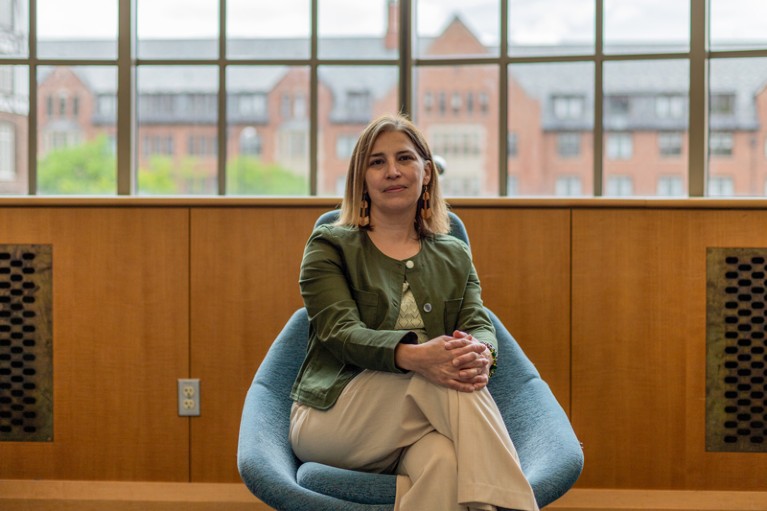Seven weeks after being awarded a US$12.9-million grant to assess dementia risks in vulnerable populations, Briana Mezuk received an e-mail informing her that it was being terminated.
Mezuk, an epidemiologist at the University of Michigan in Ann Arbor, had honed her federal grant application over two years to take advantage of the National Survey of American Life — a seminal study of 7,000 participants that examined racial, ethnic and cultural influences on mental health1. Started by Mezuk’s mentor, James S. Jackson, a former director of the Institute for Social Research at the University of Michigan, it is the only nationally representative sample of the mental health of Black Americans, who are twice as likely as their white counterparts to develop Alzheimer’s disease. Mezuk planned to follow up with those participants 25 years after the first interviews took place and examine how their life experiences and mental health had contributed to their dementia risk.
The five-year grant was awarded on 1 February by the National Institute on Aging, a division of the US National Institutes of Health (NIH), based in Bethesda, Maryland. But on 21 March, it fell foul of the disdain that the administration of US President Donald Trump has expressed for projects including the terms diversity, equity and inclusion (DEI).
Harvard researchers devastated as Trump team cuts nearly 1,000 grants
According to Grant Watch, a database tracking terminated grants from the NIH and the US National Science Foundation (NSF) — the country’s independent federal science-funding agency — more than 4,500 NIH grants awarded to US institutions have been terminated, representing some $6.1 billion of lost funding. And according to its 27 May account, a total of 1,752 grants, amounting to roughly $1.5 billion, had by then been terminated at the NSF.
“The largest studies on dementia risk only have 800 Black participants. We were going to have 3,000,” says Mezuk, who appealed through the NIH against her grant cancellation. “It is critically important that a diverse set of experiences are represented. If we keep asking the same question in the same populations, we will get the same answer.” Her planned research aimed to glean fresh insights to help ‘baby boomers’, referring to the generation born between 1946 and 1964, to manage dementia risks.

Epidemiologist Briana Mezuk’s grant to study dementia risk in older Black people was reinstated after her appeal. Credit: University of Michigan School of Public Health
But such terminations don’t just affect the research team involved. Many grant cancellations affect community research partners. Adelia Cooley is a member of the community advisory board for the Healthier Black Elders Center, an outreach programme that includes researchers at three Michigan universities working to improve the health of older Black adults in Detroit and Flint. Cooley says her biggest concern is the impact that the cuts will have on Black Americans, a demographic in which the risk of dementia (in those aged 55 or over) is roughly 45%2. “To say this is irrelevant or not necessary is horrible.”
Agency appeals, however, as well as multi-complaint lawsuits, are getting some terminations reversed. On 16 June, a judge in Maryland ruled that NIH grants in two lawsuits — one filed by 16 state attorneys-general, the other by four researchers and three organizations with scientific members — were terminated unlawfully. The ruling reinstates roughly 800 grants and subawards named in the lawsuits. A follow-up ruling on 2 July suggests that the NIH cannot use discriminatory directives to terminate grants. But the Trump administration is likely to appeal against the decision, extending delays and confusion over terminated grants.
Mezuk’s grant was not part of any lawsuit, but she received a 19 June memo from the NIH stating that her appeal “has convinced them that, with revision, the grant is likely allowable”. The vaguely worded correspondence offered her a piece of guidance: remove participant-survey questions about experiences of discrimination. On 10 July, she received notice that her grant had been fully reinstated.
Nature’s Careers team spoke to 20 researchers who have lost grants from the NIH, the NSF, the Environmental Protection Agency (EPA), the Department of Defense, the Centers for Disease Control and Prevention (CDC) and NASA. Mezuk, for one, is lucky in that her institution supported her appeal. Some universities forbid such attempts.

#OpenToWork: how laid-off US scientists are coping with shattered careers
During the reporting of this article, several interviewees had their grants reinstated, offering hope amid the chaos — although only about one-fifth of NIH-terminated grants have been flagged by Grant Watch as possibly reinstated through appeals or court cases so far. Many researchers are spending the bulk of their time frantically applying for grants to secure enough funding just to keep their work going. But the amounts they can hope to gain pale in comparison with the money lost through the federal-government cuts. Others are exploring new fund-raising strategies altogether – including campaigning through GoFundMe, the world’s largest fundraising platform.
Collateral community damage
Mara Freilich, an environmental scientist who started her research group at Brown University in Providence, Rhode Island, in 2023, lost her first federally funded grant from NASA on 21 March because it was considered “radical and wasteful DEI” spending, according to the e-mail she received from the agency. The funding had been helping a multi-institutional team working with community advocates and citizen scientists to analyse air quality around the Salton Sea, a large, landlocked and highly saline lake in southern California. “One of my big concerns is that the trust in science and in scientists is broken,” says Freilich. It weighs on her that scientists might not be able to follow through on the promises they made to community partners, such as sharing the air-quality findings in a timely manner.

The Salton Sea field site in California, where Mara Freilich’s group studied air-pollution emissions; the project was funded by a now-terminated NASA grant. Credit: Ryan Sinclair, Loma Linda University
In a study published on 31 May3, Freilich and her collaborators identified hydrogen sulfide emissions from the Salton Sea as an air pollutant of concern. The research was funded, in part, by the terminated NASA grant, which was also intended to develop innovative ways of using satellite data to predict hydrogen sulfide emissions. Freilich’s appeal against the cancellation was unsuccessful.
The grant terminations for Mezuk, Freilich and others have had a domino effect. Big studies often involve collaborations between several institutions. Freilich’s grant termination compromises funding for research partners at the University of California, Los Angeles; Loma Linda University in southern California; and Alianza Coachella Valley, a community group that aims to improve environmental conditions in the region.
Alida Cantor, a geographer at Portland State University in Oregon, is also trying hard to maintain ties with community partners. Cantor lost two grants, from the NSF and the EPA, because her research included the banned term “environmental justice”, as related to the intersection between energy development and water availability in the western United States. The funding loss affects four academic institutions, as well as community partners. “Out of respect for our research participants, I’m not going to chuck the data,” says Cantor. “My priority is just being ethical in my relationships with research collaborators, participants, community partners and students.” Oregon was one of 16 states that sued the government to get terminated grants reinstated, and although Cantor is hopeful, she hasn’t heard anything more.
Appeals for some
Appealing against a grant termination usually entails assembling a dossier of evidence to submit to the funder. But success rates have been difficult to determine. The University of Utah’s $38 million Clinical and Translational Science Award, a seven-year grant first awarded by the NIH in 2023, was reinstated on 29 March. Grant Watch states on its website that it thinks the government “has restored a limited number of NIH grants that it previously terminated, often without providing public notice”.
Charles DeCarli, director of the University of California Davis Alzheimer’s Disease Center, is another of the few people known to have succeeded in an appeal. DeCarli was in the fifth year of a $36-million NIH grant programme to study the vascular factors that lead to dementia in a diverse population. Currently, he and his team have around 1,700 participants enrolled out of a hoped-for total of 2,250. (They lost around 100 participants in the weeks after the grant was initially terminated). DeCarli says his wife summarized the recipe for success best: support from university, peers, the NIH, the Alzheimer’s Association and the American Heart Association, and a dash of pixie dust. “We don’t really know why our appeal was successful,” he says.
DeCarli took three weeks to put together a 41-page appeal that contained 16–18 pages of justification, with 50 references; the rest he describes as “legalese”. He emphasized all the ways in which his work furthered NIH priorities to study chronic illness as promoted by Make America Healthy Again, Trump’s populist campaign tailored to promote the aims of the US Department of Health & Human Services (HHS) under Robert F. Kennedy, Jr. DeCarli also pointed out that he had been awarded the grant in 2020, during the first Trump administration. He received a grant-reinstatement notification just a few days after he submitted his appeal.
“If at all possible, push back,” he advises. “Seek the support of your institution. Seek the support of the free press, colleagues, programme officers. Researchers are “a small group”, he adds. “We should organize.”
Early-career researchers who appeal against the termination of training awards earmarked for diverse candidates are on particularly uncertain terrain – especially if the funding mechanism is terminated. For example, the NIH’s F31 training grants are coveted awards designed to support an individual’s PhD training and research. Since 2002, there have been two options: a standard F31 and a diversity-focused F31, designed to bolster candidates from marginalized or low-income backgrounds. About 30% of the 1,000 or so F31 training grants awarded in 2024 were funded by the diversity mechanism. Patrick Kelly, a third-year PhD candidate at Brown University, was awarded one of them. Kelly’s grant was cancelled in May, along with other diversity-specific F31 awards. Still, he wrote an appeal emphasizing how his dissertation research focused on drug use and drug-related harm from fentanyl, a priority of the HHS.
Kelly, a white man, qualified for the award because he is a first-generation student from a low-income background. On 27 June, he was notified that his grant had been reinstated and that funds were available for him to continue the research proposed in the grant. “I remain cautiously optimistic that the remaining years of the fellowship will also be awarded,” he says, but he acknowledges there’s no guarantee of that.
Scientists who might be political targets themselves — notably those at Harvard University in Cambridge, Massachusetts, and at Columbia University in New York City — also hold out little hope for appeals. Trump has cut federal funding and contracts at both institutions, claiming that student protests in support of Palestinian people are evidence that the establishments “tolerate antisemitism”. On 16 June, a judge dismissed a lawsuit brought by faculty members at Columbia University over Trump-administration funding cuts — because the university itself was not a plaintiff.

NIH grant cuts will axe clinical trials abroad — and could leave thousands without care
Columbia pulmonologist Jeanine D’Armiento had one time point left to collect data related to diagnosing a rare genetic disorder that affects the lungs and liver. But on 28 March, she lost her NIH funding for the study. Without those final data “everything we’d done for the last four years was wasted”, she says. At the same time, she lost funding for research on another rare lung disease; both grants were terminated weeks after the initial wave of $400 million in grant losses at Columbia in mid-March.
D’Armiento, who chairs the executive committee of Columbia’s university senate, says her grants have none of the “bad” phrases, such as DEI, that are red flags for the Trump administration. Her trial was designed to recruit individuals in often-overlooked rural settings, among others, she says. She thinks she’s been targeted because the senate supported due process for student protesters. “I’m saddened by the loss of so much of my work,” she says. As it stands, she hopes that patient advocacy groups will help to raise money for her to finish the research. In fact, one trial participant asked her wedding guests to donate to D’Armiento’s research — and raised roughly $13,000.
Philanthropic life support
Beyond federal funding sources, many turned immediately to philanthropic institutes — notably, the Robert Wood Johnson Foundation (RWJ) in Princeton, New Jersey, which is the largest such organization focused solely on health in the country. So far, the RWJ has put together several pools of money to keep terminated research “on life support”, says Alonzo Plough, the foundation’s chief science officer and vice-president for research evaluation and learning.
“What philanthropy can do is important, but it is orders of magnitude less than the billions in federal funding,” says Plough. “We fund in the serious millions, but what has been cut has been serious billions,” he adds.



